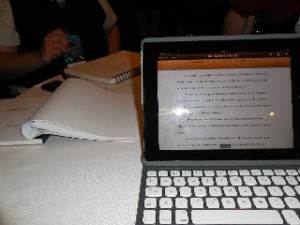For those of you who don’t know, Dragoncon is the largest science fiction convention in the US (ComicCon specializes in comic-type stuff while Dragoncon covers anything science fiction). They have a great Writer’s Track and two different workshops for writers during the con. This year, I opted for the Michael Stackpole/Aaron Allston workshop (with special guest Timothy Zahn). Here’s some of what I learned:

That “wall of books” at your local bookstore will be totally different by the time you write that “hot” book – don’t bother trying to catch the wave. “Evergreen” science fiction areas include epic fantasy, military science fiction, alternate history, time travel, and YA pet fantasies. Do your research and see what’s selling really well in an area you like to read and write about; find the five top authors and read their last two books. That will give you an idea of the best writing in that area. That’s what you have to measure up to! — Michael Stackpole, “Writing a Knock-Out Novel”
In another panel, “Writing in the Post-Paper Era,” Stackpole related a story about a time that he was signing books at a table next to Fred Saberhagen, one of his favorite authors. A young fan came up to him, nervous, and asked for an autograph. Stackpole turned to Saberhagen after the girl had walked away, and told him he’d been just as nervous meeting Saberhagen for the first time. “I just can’t believe anyone would be nervous about meeting me,” he said.
“She wasn’t here to meet you,” Saberhagen replied. “She was here to meet The Author.”
When presenting yourself on the internet, remember that your author persona must be different from your personal one. You are an entertainer. “This isn’t about real, genuine, and authentic – it’s about marketing,” Stackpole says. “Never tweet about failure!”

“Die, adjective, die!” – Aaron Allston, “Description.” Use only the perfect adjective or adverb. They may be efficient descriptions, but this is at the cost of emotional content. Go for the emotion.
“Written fiction is not a passive form of entertainment,” Allston says. “Engage the reader so that they participate.”
I’ll be sharing some specifics of the seminar over on the TWWS Blog at LiveJournal – see the links page to get there.
I also attended several fun panel discussions over in the Writer’s Track: “Fightin’ and Writin'” (John Ringo, Jim Butcher, Faith Hunter, John Robinson, Kevin Dockery, and Sabutai Musashi) and “Dyin’ Laughing” (Bill Faucett, C.L. Wilson, John Ringo, and Debbie Viguie). Here are some highlights:
“Get seven of your research experts drunk. Then put their arguments into your book. It writes itself!” – John Ringo on using expert advice as a research tool.
“You will be beat into the ground if you make a mistake,” says Kevin Dockery. “I’m talking about a decimal point.” (Ringo raises hand and nods vigorously) “The more technical you want to get, the better your references must be.”

Asked “Is combat sexy?” the panelists all stared at Dockery, who had an entire room at the Hyatt called “The Armory,” where he showed off a huge collection of weaponry. “Because I’m the butt,” he says, “I’m going to jump in first. I don’t find it sexy. There are situations where it’s more exciting, but long distance combat is mechanical and isolating. To me, it’s a machine.” (Ringo plays an imaginary violin)
In “Dyin’ Laughing,” Faucett asked the panelists why they kill off important characters. “I’m sick, evil, and twisted,” says Wilson.
“I kill off my fans,” says Viguie. “I use their names in my books for characters who die.”
“Never kill the pet!” John Ringo says. “Tom Hanks still hasn’t recovered from ‘Turner and Hooch.’ I did actually write one short story where nobody dies, though. I must have had pneumonia or something – and my stuff is sparkly rainbows coming out of unicorns’ asses compared to David Drake!”
